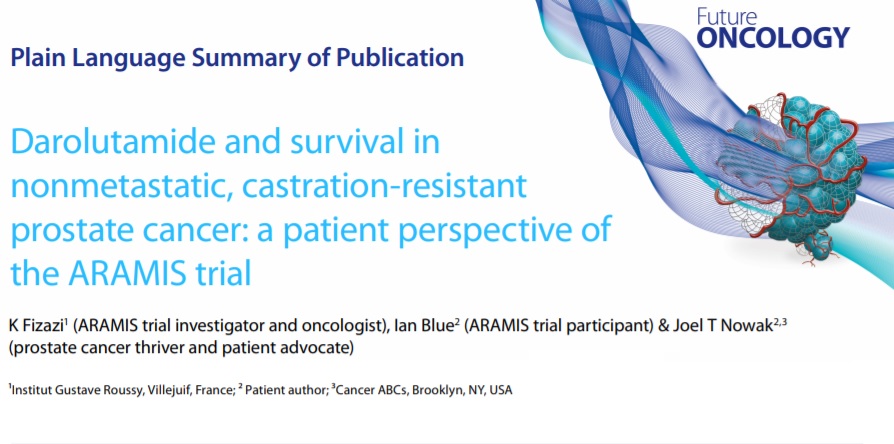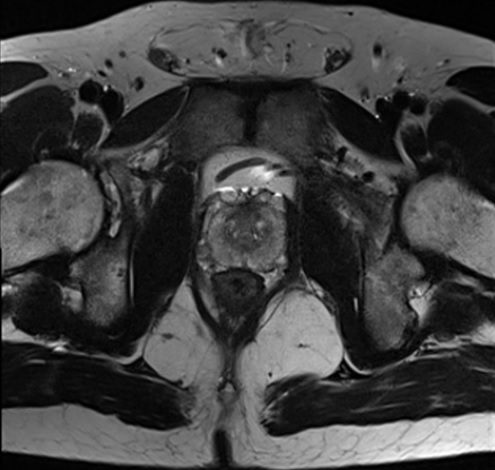|
In this issue:
|
|
|
|
|
Reductions in PSA testing linked to metastatic diagnosis
New American study suggests need for screening programmes
|
|
|
|
|
Cancer death rates fall, but concern over prostate trend
Major new study provides little grounds for celebration, says Europa Uomo
|
|
|
Prostate Research and Treatments
Can AS Patients Have Less Intensive Surveillance?
|
|
|
Darolutamide & the ARAMIS Trial
Longer to metastases and longer overall survival
Men on Androgen Deprivation Therapy who find that their PSA levels are rising are regarded as non-metastatic Castration-Resistant Prostate Cancer (nmCRPC) but current scanning technologies may not be able to find any evidence of the location of what is presumed to be a growing tumour(s). Until recently there was no additional treatment for men in this situation. In the last issue we wrote about Apalutamide which is now on the market for nmCRPC and the results of the ARAMIS trial have brought a further drug treatment, Darolutamide (commercial name Nebqua) for this phase of the disease.
The ARAMIS trial had two arms, one with Darolutamide and the other with a sugar pill placebo. The trial results showed that the drug arm extended the time to metastases and had longer overall survival. Additionally, the incidence of falls and resulting fractures was lower. This is thought to a result of the drug not passing the blood/brain barrier.
Read more: https://www.futuremedicine.com/doi/pdf/10.2217/fon-2020-1291. This is a plain language summary with a patient perspective included.
 |
|
|
IP1 - Prostagram Trial - 'Short' MRI for PCa
Using biparametric (bp) magnetic resonance imaging (MRI) to screen for prostate cancer identified twice as many clinically significant cancers as standard prostate-specific antigen (PSA) tests. Moreover, the UK study, reported in JAMA Oncology (11 February), found bpMRI improved detection of prostate cancers without leading to unnecessary biopsy or over diagnosis.
The developers of what has been dubbed as ‘short MRI’ or bpMRI scan claim that it speeds up of the process to less than 10 minutes compared with a standard mpMRI taking more than 30 minutes, together with focusing solely on the prostate area and not using contrast agents. If cancer is detected with this short MRI then it can be followed up with more detailed scans looking beyond the prostate.
Read more: Study brings mas MRI screening for prostate cancer a step closers biparametric | Cancer World Magazine
|
|
|
Europa Uomo News
Special General Assembly
Special General Assembly: Notices have issued to member organisations giving details of the proposals to be considered at the Special General Assembly on 26 March 2021 at 4pm CET. Please ensure that you notify the Secretariat of the name of the Voting Delegate for each country and the names of any other additional delegates who wish to attend this virtual meeting.
|
|
|
EAU Annual Congress changes to Virtual again
EAU Annual Congress changes to Virtual again. For the second time the EAU has decided to change its arrangements for this year’s Annual Congress. Due to the circumstances relating to Covid-19 it was felt that holding an in-person Congress in Milan this July was not feasible. The EAU is working on the content of a virtual Congress. The Europa Uomo Board normally attends the Congress and many associated meetings in that weekend. The Board will pursue other meetings with patient groups, medical friends and sponsors in a way similar to that of last year.
|
|
|
Items of Interest
March - Cancer Nutrition Awareness Month
Every year in March ECPC organises the Nutrition Awareness Month to increase awareness of this crucial, yet often neglected, component of cancer prevention, treatment support and rehabilitation.
For this year’s edition, they have gathered several stories of cancer patients and cancer survivors who told us about their experiences. The booklet was endorsed by the European Federation of the Associations of Dietitians (EFAD) and the Medical Nutrition International Industry association (MNI).
See booklet: Living well during cancer treatment. Patients’ Stories | European Cancer Patient Coalition (ECPC)
|
|
|
Haematuria - Blood in Urine
Haematuria is blood in the urine. There are two types of haematuria. Gross haematuria is when you can see the blood in your urine. Microscopic haematuria is when you can’t see blood in the urine, but it is found with a urine test and seen under a microscope. Most people with microscopic haematuria don’t have symptoms.
If you see blood in your urine, tell your doctor. They will want to see you for an exam, where they will review your full health record and have you take a urine test. In some cases, a blood test or ultrasound may also be needed.
Haematuria is treated by getting to the underlying cause. For instance, haematuria caused by a urinary infection is often treated with antibiotics. Haematuria caused by an enlarged prostate may require more tests to determine the best treatment.
Read more: Insights – Spring 2021 (urologyhealth.org)
|
|
|
|
|
|
FREE SUBSCRIPTION TO EUROPA UOMO MONTHLY UPDATE
All previous issues are available on website: www.europa-uomo.org/newsletters/
|
|










